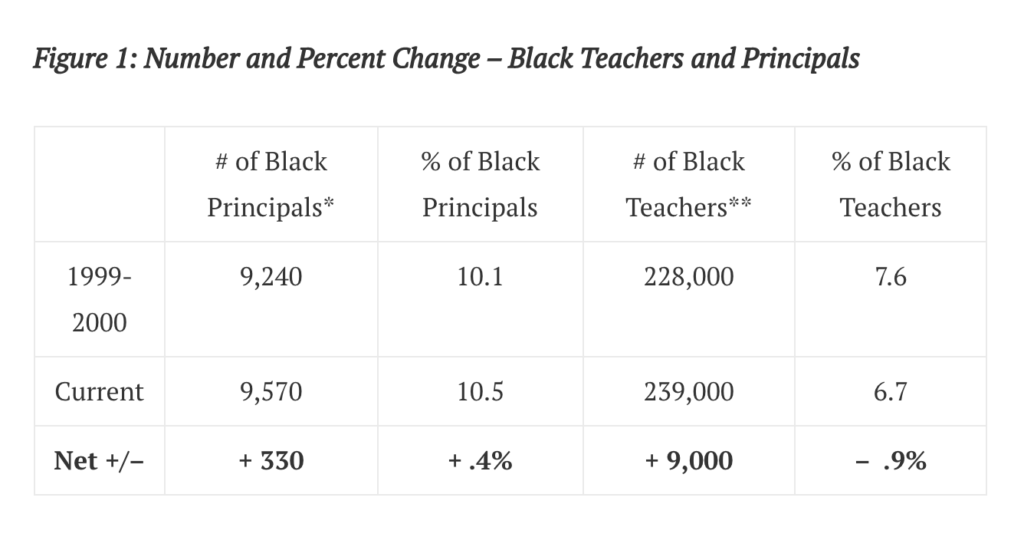
The research is clear on the impact of Black teachers on Black student achievement. Black students who have had at least one Black teacher are more likely to graduate from high school, attend college and are less likely to drop out of school. Black students are also less likely to be disciplined at the hands of a Black teacher.
But what about Black principals; what does the research say about their impact on Black students? A recently released report may provide us with some new insights.
A Wallace Foundation report investigated how principals affect students and schools using two decades of research. According to the report, a principal in the 75th percentile of effectiveness yields an increase in student learning in reading and math of about three months, nearly as much as the four months of increased learning generated by a teacher at the 75th percentile, but across an entire school.
The report noted that effective principals carry out certain behaviors, including engaging in high-leverage instructional activities, strategic managing of staff and resources as well as establishing a productive environment. These behaviors, suggested for school leaders, in addition to emphasizing diversity and inclusiveness of teachers and students, can come by way of experience, but require more education and training.
To that point, more often, Black principals have the training and education to get the job done. Black principals are the highest percentage of principals with their doctorate or professional degrees, i.e. education. This is true for Black principals in public or private schools.
Further, the report found that [pullquote]principal race or ethnicity more consistently correlates with positive outcomes for students from the same racial or ethnic group.[/pullquote] The report cited numerous studies to explain Black principal impact on Black student’s math scores and their receiving gifted and talented services.
Yet the effects of principals are largely indirect; the impact of principals is tied to teachers, due in part to principal influence on teacher hiring.
It matters for Black children because Black principals influence where Black teachers teach.
The report cited a study saying [pullquote position="right"]Black principals are more likely to hire a Black teacher[/pullquote] than a white principal in the same school and that Black teachers are less likely to leave their school when the school is led by a Black principal than when that same school is led by a white principal.
So, if Black teachers impact Black student achievement, and Black principals are in a position to influence the hiring of, or hire, Black teachers, why then are only 6.7% of all teachers Black? In light of this report, the same can be asked regarding Black principals; why are only 10.5% of all principals Black in light of their impact?
Answer that question can begin with the application of the 1954 Brown vs Board U.S. Supreme Court decision.
More than 38,000 Black teachers in the South and border states lost their jobs. As for Black principals, what happened to them was equally as disastrous. In the decade following the Brown decision, an estimated 90% of Black principals across eleven southern states lost their jobs.

As documented in the report, over the last 20+ years, the number of Black teachers and principals hasn’t increased significantly. Even with a 4% increase in the number of Black teachers within 20 years (which is hardly exemplary), the percentage of Black teachers decreased. It’s because Black teachers are hired less often compared to others. Equally egregious is that in 20 years, there’s only a 330 net gain of Black principals nationwide.
In 30 years, fewer Black teachers were hired compared to other racial groups. This is why Black principals matter because Black principals influence Black teacher hires, just as white principals tend to influence white teacher hires.
But if there are only 330 more Black principals in place nationwide, can we be sure that districts are hiring Black teachers?
According to a 2019 working paper, schools with African American principals are 5 to 7% more likely to hire Black teachers; much of that having to do with the phenomena that Black principals, and white principals, tend to hire teachers who share their own racial category. In addition, retention rates are higher for teachers who share their principal’s racial identity; Black teachers at schools where the lead administrator was also Black were 2 to 5% less likely to transfer to another school.
The reason may be due to a shared mission for social justice.
Marginalized educational experiences make it very likely for Black principals and other principals of color to promote multiculturalism, social justice and equity and as a result, they tend to challenge assumptions about how schools function, strategize, and operationalize teaching and learning. Likewise, [pullquote]Black teachers and other teachers of color seek and need relational ways of being in their work that honors their own families and communities through the success of their students.[/pullquote]
Black principals understand and nurture that need.
Clearly, white principals hire Black teachers and Black principals consider qualities such as years of experience, ability and the likely fit within the school, in addition to the race of the candidate, when making a faculty hiring decision.
However, Black students benefit greatly from Black teachers, as the research suggests, and combined with a shared sense of purpose and passion, [pullquote position="right"]Black principals consider the addition of Black faculty a priority.[/pullquote]
The argument has been made that Black principals (or any principal) shouldn’t just hire Black teachers because they are Black; that the best teacher candidate should be hired. White educators have said that to me and my response was, and is, considering the overwhelming number of white teachers, do you think that every white teacher hired was the best candidate?
This isn’t to say that teacher quality isn’t important, but children learning from someone who looks like them matters. It mattered enough to white parents and educators to exclude Black educators from educating their children after the Brown decision.
White parents continue to segregate their children today.
Why shouldn’t it matter to Black people that Black educators educate Black children, particularly when the research proves the benefits of Black teachers and Black principals for Black children?
It is a no-brainer for school districts serious about adding Black faculty to their schools, to add Black principals.
One way of doing so would be to promote from within:
The Center for Black Educator Development in Philadelphia just received funding to do that kind of work nationwide.
Maybe schools serious about teacher diversity should reach out for help with building their own bridge for Black teachers. Now is not the time for standing pat.
Rann Miller is a director of a federally funded after-school and summer program in southern New Jersey. He spent six years teaching in charter schools in Camden, New Jersey. Rann is the creator, writer and editor of the Official Urban Education Mixtape Blog. His writing on race and urban education has appeared in Salon, AlterNet, and the Progressive, where he is an education fellow.
If you have a child with disabilities, you’re not alone: According to the latest data, over 7 million American schoolchildren — 14% of all students ages 3-21 — are classified as eligible for special...
The fight for educational equity has never been just about schools. The real North Star for this work is providing opportunities for each child to thrive into adulthood. This means that our advocacy...
The story you tell yourself about your own math ability tends to become true. This isn’t some Oprah aphorism about attracting what you want from the universe. Well, I guess it kind of is, but...
Your donations support the voices who challenge decision makers to provide the learning opportunities all children need to thrive.
Ed Post is the flagship website platform of brightbeam, a 501(c3) network of education activists and influencers demanding a better education and a brighter future for every child.
© 2020–2024 brightbeam. All rights reserved.